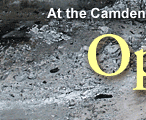
|
INSIDE AN OPEN-HEARTH COOKING CLASS
A One-Day Experience in 18th-Century Kitchen Life
Photography by Hoag Levins
 | |
 March 15, 2007
March 15, 2007

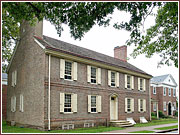
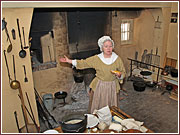
|
|
CAMDEN, N.J. -- One of Camden's least-known historic jewels, Pomona Hall (above, left), located on the city's far border with Collingswood, is a fully restored 18th-century mansion that once housed the region's richest family. Hearth cook and teacher Mercy Ingraham (above, right) welcomed ten women who signed up to take the Camden County Historical Society's first one-day class in open-hearth cooking. The enormous hearth in Pomona Hall's kitchen -- 10 feet across, 7 feet high and nearly four feet deep -- even has its own window.
|
|
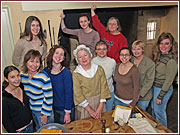
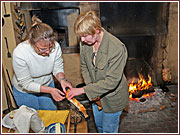
|
|
The ten students (above, left) in the open-hearth cooking session included an archaeologist, a federal agent, a real estate agent and a 13-year-old who was given the $30 enrollment in the class as a birthday presesnt. Above right: Roz Pappas of Woodstown (left) and Robin Lewis of Williamstown (right) work together to get fresh-cut bread into the iron implement that will hold it as it toasts by the fire.
|
|
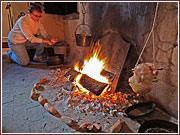
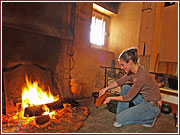
|
|
The hands-on class worked throughout the day to cook lunch and dinner meals for eleven. Above, left, Roz Pappas stirs soup in an iron pot. In the foreground, a chicken is hung on a string that is constantly twirled for even cooking. Meanwhile, Lauren Milideo (above, right) of Stratford turned sweet potatoes that were laid out to cook by the heat of the coals.
|
|
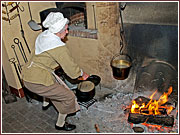
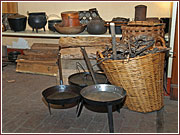
|
|
Instructor Mercy Ingraham (above, left), a member of the Historic Foodways Society of the Delaware Valley who's taught open-hearth cooking for the last 10 years, demonstrates the safe way to hoist heavy iron kitchen pots filled with boiling food. In terms of physical exertion, hearth cooking is almost like a gym workout, requiring the lifting of solid iron implements, pots and wood. Above, right: some of the materials and tools used throughout the day to prepare foods exactly as they would have been prepared in the house more than two centuries ago.
|
|
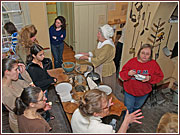
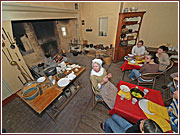
|
|
Topping off the total experience were two meals at which class members got to eat what they had cooked (above, left). The menu included mushroom soup; bread; roasted chicken with apple, onion and herb stuffing; roasted sweet potatoes; a brown bread pudding and a dover cake. All were baked from recipes that are more than two centuries old. Above right: Pomona Hall has an unusually large kitchen that includes room for tables, so the students got to enjoy their meals close by the fire that had cooked them.
|
|
All Rights Reserved © 2007, Hoag Levins
HoagL@earthlink.net
About this Web site
|
|

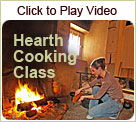


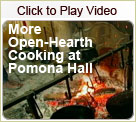


Also see:
Chef Walter Staib's Hearth Cooking
|
